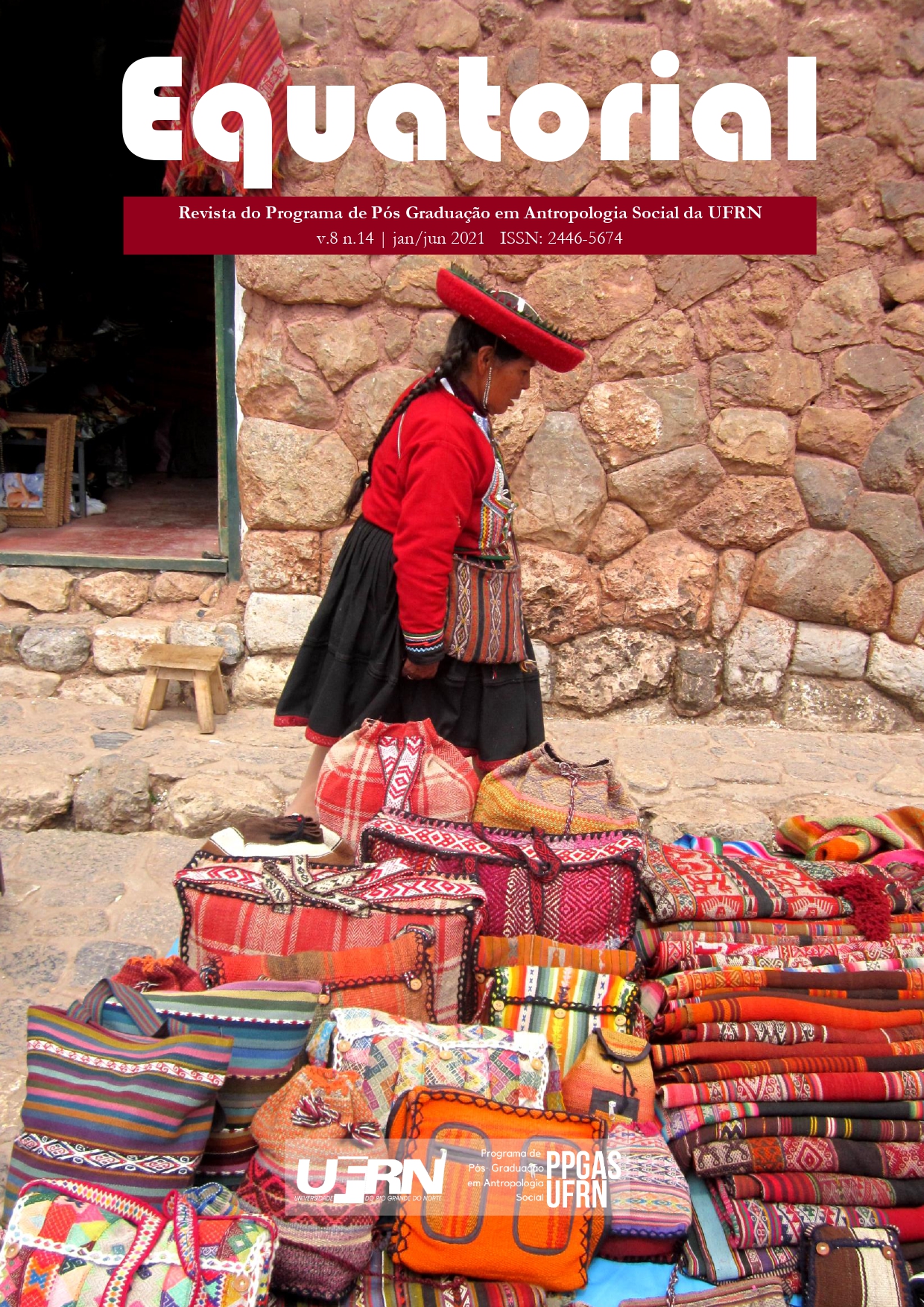Discurso sobre el Colonialismo de Aime Césaire
una lectura em clave de feminismo latinoamericano descolonial
DOI:
https://doi.org/10.21680/2446-5674.2021v8n14ID23828Palabras clave:
Colonialismo; Aimé Césaire; feminismo latino-americano descolonialResumen
En este texto, la antropóloga colombiana Mara Viveros analiza la importancia y sagacidad del “Discurso sobre el colonialismo” de Aimé Césaire, señalando al autor Martiniqués como un emblema de la conciencia antirracista y anticolonial en el mundo. Al mismo tiempo que expone la relevancia del “Discurso sobre el colonialismo” para el mundo afro-latinoamericano y para los proyectos feministas decoloniales latinoamericanos contemporáneos, la autora identifica la omisión en la obra de Césaire de los asuntos que hoy en día podríamos llamar de género. El texto está organizado en tres partes: la primera visita la propuesta del autor con foco en su aguda y profética respuesta, en nombre de los pueblos colonizados, al proyecto europeo de civilización. En segundo lugar, se ocupa de las tensiones formuladas por las demandas de una igualdad que reconozca las diferencias que fueron expuestas por el autor. Finalmente, sugiere varios elementos de la propuesta teórico-política de Césaire que podrían ser útiles para los movimientos feministas latino-americanos, especialmente para los feminismos descoloniales y antirracistas.
Descargas
Citas
AMIN, Samir. De la crítica del racialismo a la crítica del euroccidentalismo culturalista. In: CÉSAIRE, Aimé. Discurso sobre el colonialismo. Madrid, España: Akal, 2006.
BONILLA, Yarimar. Guadeloupe, labor protest. In: NESS, I. (Ed.). International encyclopedia of revolution and protest. Oxford, UK: Blackwell, 2009.
BONILLA, Yarimar. Césairean transcripts. Counter-response by Yarimar Bonilla [Prompt: Whither or whether postcolonial sovereignty?]. 2013. Disponível em: http://cesairelegacies.cdrs.columbia.edu/political-legacy/thinking-with-aime-cesaire. Acesso em 25 jul. 2019.
CÉSAIRE, Aimé. Discurso sobre el colonialismo. In:______. Discurso sobre el colonialismo. Madrid, Spain: Akal, 2006a.
CÉSAIRE, Aimé. Carta a Maurice Thorez. In:______. Discurso sobre el colonialismo. Madrid, España: Akal, 2006b.
CÉSAIRE, Aimé. Discurso sobre la negritud. Negritud, etnicidad y culturas afroamericanas. In:______. Discurso sobre el colonialismo. Madrid, Spain: Akal, 2006c.
CONFIANT, Raphael. Aimé Césaire. Une traversée paradoxale du siècle. Paris, France: Stock, 1994.
ESPINOSA MIÑOSO, Yuderkys; GÓMEZ CORREAL, Diana; OCHOA MUÑOZ, Karina. (Eds.). Introducción. In:______. Tejiendo de otro modo: Feminismo, epistemología y apuestas descoloniales en Abya Yala. Popayán, Colombia: Editorial Universidad del Cauca, 2014.
GROSFOGUEL, Ramón. Actualidad del pensamiento de Césaire. Redefinición del sistema-mundo y producción de utopía desde la diferencia colonial. In: CÉSAIRE, Aimé. Discurso sobre el colonialismo. Madrid, Spain: Akal, 2006.
GUILLAUMIN, Colette. Racism, sexism, power, and ideology. London, UK: Routledge, 1995.
HILL COLLINS, Patricia. The social construction of black feminist thought. Signs, n. 14, p. 745–773, 1989.
JOSEPH-GABRIEL, Annette. K. Beyond the great camouflage: Haiti in Suzanne Césaire’s politics and poetics of liberation. Small Axe, n. 20, p. 1–13, 2016.
LOUIS, Patrice. A, B, C.ésaire. Aimé Césaire de A à Z. Martinique: Ibis Rouge Editions, 2003.
LOUIS, Patrice. Aimé Césaire: Rencontre avec un nègre fondamental. Paris, France: Arléa, 2004.
LUGONES, María. Multiculturalismo radical y feminismos de mujeres de color. Revista Internacional de Filosofía Política, n. 25, p. 61–75, 2005.
MALDONADO-TORRES, Nelson. The topology of being and the geopolitics of knowledge: Modernity, empire, coloniality. City, n. 8, p. 29–56, 2004.
MALDONADO-TORRES, Nelson. Aimé Césaire y la crisis del hombre europeo. In: CÉSAIRE, Aimé. Discurso sobre el colonialismo. Madrid, Spain: Akal, 2006.
MELLOR, Mary. Feminismo y ecología. Ciudad de México, México: Siglo XXI Editores, 2000.
MIGNOLO, Water. The geopolitics of knowledge and the colonial difference. The South Atlantic Quarterly, n. 101, p. 57–96, 2002.
MINA, Charo; MACHADO, Marilyn; BOTERO, Patricia; ESCOBAR, Arturo. Luchas del buen vivir por las mujeres negras del Alto Cauca. Nómadas, n. 43, p. 167–185, 2015.
RED DE FEMINISMOS DESCOLONIALES. Descolonizando nuestros feminismos, abriendo la mirada. Presentación de la red de feminismos descoloniales. In: ESPINOSA MIÑOSO, Yuderkys; GÓMEZ CORREAL, Diana; OCHOA MUÑOZ, Karina (Eds.) Tejiendo de otro modo: Feminismo, epistemología y apuestas descoloniales en Abya Yala. Popayán, Colombia: Editorial Universidad del Cauca, 2014.
VERGÈS, F. Aimé Césaire: Nègre je suis, nègre je resterai. Entretiens avec Françoise Vergès. Paris, France: Albin Michel, 2005.
WILDER, Gary. Thinking with Aimé Césaire. Response by Gary Wilder. 2013. Disponível em: http://cesairelegacies.cdrs.columbia.edu/political-legacy/thinking-with-aime-cesaire/. Acesso em 25 jul. 2019.
WILDER, Gary. Freedom time: Négritude, decolonization and the future of the world. Durham, NC: Duke University Press, 2015.
Descargas
Publicado
Cómo citar
Número
Sección
Licencia
Autores mantém os direitos autorais e concedem à revista o direito de primeira publicação, com o trabalho simultaneamente licenciado sob a Licença Creative Commons Attribution que permite o compartilhamento do trabalho com reconhecimento da autoria e publicação inicial nesta revista.

 Português (Brasil)
Português (Brasil) English
English Español (España)
Español (España)


